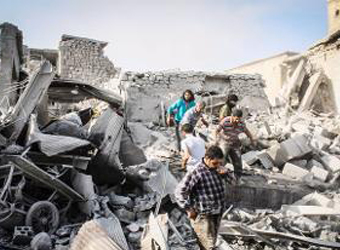More than a hundred buses carrying thousands of al-Qaeda-linked fighters and Syrian refugees drove down a dirt road from Lebanon into Syria on Wednesday, in what was the last phase of an exchange deal between Syria’s al-Qaeda branch and Lebanon’s militant Hezbollah group.
The departure of al-Qaeda fighters from the Lebanon-Syria border comes three years to the day its fighters stormed the Lebanese border town of Arsal and captured two dozen soldiers, killing some in captivity and releasing others. The group’s presence in Lebanon has left scores of people dead.
More than 7,000 Syrian refugees and gunmen, including a top al-Qaeda operative in Syria known as Abu Malek al-Talli, were aboard the 113 buses the left Lebanon’s Arsal region toward the Syrian border village of Fleeta, according to the government-controlled Syrian Central Military Media.
The militants and civilians final destination will be the jihadi-held part of northwestern Syria, according to an agreement between Lebanon, Syria, Hezbollah, and Syria’s al-Qaeda affiliate. That group is known as the Hay’at Tahrir al Sham militant alliance — Arabic for the Levant Liberation Committee — or HTS.
“The Nusra Front was defeated in Lebanon,” said the announcer of Hezbollah’s Al-Manar TV, using the old name of al-Qaeda’s affiliate in Syria. The long line of buses drove through the partially paved mountain road between the two countries as Hezbollah fighters in beige uniforms and carrying Kalashnikov assault rifles watched them drive by. Masked gunmen could be seen inside the buses on the road that was decorated with Lebanese flags and yellow Hezbollah banners.
The long line of buses drove through the partially paved mountain road between the two countries as Hezbollah fighters in beige uniforms and carrying Kalashnikov assault rifles watched them drive by. Masked gunmen could be seen inside the buses on the road that was decorated with Lebanese flags and yellow Hezbollah banners.
Hezbollah combatants have been fighting along Syrian President Bashar Assad’s forces since 2013, and the Iran-backed group is still deeply involved in Syria’s civil war, now in its seventh year.
The evacuation deal followed a military offensive by Hezbollah fighters and Syrian troops during which they captured border areas between the two countries and left hundreds of al-Qaeda fighters besieged in a small rugged mountainous area.
The fighting ended with a cease-fire on July 27 for negotiations to allow refugees, fighters, and family members leave to Syria’s northwest Idlib province and the central Qalamoun region.
The three Hezbollah fighters were released shortly after midnight Wednesday by HTS in return for the release of three al-Qaeda fighters who were held in Lebanon.
As part of the deal, the two groups on Sunday exchanged the bodies of their dead fighters. Hezbollah handed over the bodies of nine al-Qaieda fighters in exchange for the bodies of five of its own.
The al-Qaeda faction will release five more Hezbollah fighters it is holding in Syria once the convoy of buses arrives in Idlib.
The large number of Syrians who decided to return home shows that some refugees prefer to head back to their war-torn country rather than stay in tent settlements in Lebanon. The tiny Arab country is home to about 1.2 million Syrian refugees, or a quarter of Lebanon’s population.
The U.N. refugee agency, UNHCR, said in a statement that it is not part of the agreement that led to the latest evacuations. “UNHCR is not in a position to ascertain to what extent refugees, who are civilians by definition, are returning in this movement,” UNHCR said.
“In this context, UNHCR notes that refugee returns need to be individual decisions, based on objective information about the conditions in the place of intended return, and made free from undue pressure,” it added.
With the departure of HTS fighters from Lebanon, the Lebanese army is expected to soon launch an offensive on territories controlled by members of the Islamic State group.
Lebanese Prime Minister Saad Hariri told reporters in Beirut that authorities are ready to negotiate to discover the fate of nine Lebanese soldiers who were captured by IS in August 2014 along with those taken by HTS.
“The presence of Daesh will end in Lebanon because the Lebanese army will deal with that,” Hariri said, using an Arabic acronym to refer to ISIS.
Source: AP
